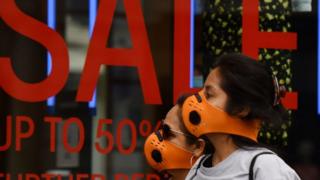Retail sales continue to bounce back in June
 Image copyright Getty Images
Image copyright Getty Images UK retail sales continued their bounce back in June, as the reopening of shops released pent-up demand.
The amount of goods sold last month increased by 13.9%, said the Office for National Statistics (ONS).
Online sales continued to go «from strength to strength», the ONS said, accounting for £3 out of every £10 spent by consumers.
Demand at food stores remained strong, hitting new highs for the pandemic period.
Compared to February, volumes of food sales were 5.3% higher while non-store retailing grew by 53.6%.
The rise followed record falls in April and a partial recovery in May as the coronavirus pandemic led to widespread shop closures and hit spending.
The ONS said the rebound brought overall retail sales back to a similar level to where they were pre-lockdown, but it added that there was a «mixed picture» in different store types.
In June, non-food stores, including department stores and clothes shops, partially recovered from strong falls during the lockdown but were still 15% lower than in February.
Non-essential shops in England were not allowed to reopen until 15 June, so they were only trading for half the month.
Jonathan Athow, ONS deputy national statistician, told the BBC that there had been «some really big changes under the surface» of the retail landscape since lockdown began.
«Food shops continue to do quite well, as we’re eating at home more,» he said.
«But the real growth has been in online sales. Online sales continue to go from strength to strength. We’ve had record online sales – £3 in every £10 of retail sales is now spent online and that’s a really big increase.»
Mr Athow said some sectors were «struggling».
«Some of that is due to the restrictions, which were only relaxed part-way through June in England. Clothing is down by about a third.
«And if you look at the High Street more generally, sales in the High Street, or physical shops, are also down by about a third.»
The proportion of online spending reduced to 31.8% in June when compared with the record 33.3% reported in May, but was a considerable increase from the 20% reported in February, said the ONS.
The ONS added that fuel sales remained at low levels, despite some recovery in May and June with the ease of travel restrictions.
One businesswoman who has taken advantage of the move to online shopping is Hellen Stirling-Baker of Small Stuff, a Sheffield-based independent retailer.
She sells sustainably made toys, gifts and homewares for young children.
«Driving my store online is how I have been able to survive,» she said.
«Offering face-to-face video calling for customers to recreate the in-store experience has been crucial and sales are picking up.
«I’ve also added new services such as local delivery by hand, which really boost engagement.»
‘Hope on the horizon’
Jeremy Thomson-Cook, chief economist at Equals Money, said the retail sector had seen a «V-shaped recovery», echoing remarks by the Bank of England’s chief economist, Andy Haldane.
«The motto of the British consumer has long been ‘When the going gets tough, the tough go shopping’ and it seems like June encapsulated that well,» he added.
«In June, there were a number of driving forces at play which saw sales rise: pent-up demand following an easing of lockdown conditions, a lack of alternatives, good weather and the furlough scheme still running at full steam.
«All four of these driving forces are likely to dwindle in the coming months and that’s when we’ll see just how strong demand is.»
Silvia Rindone, retail partner at EY, said the latest figures showed there was «some hope on the horizon», with consumers beginning to show «a cautious optimism».
But she added: «We’re still not past the pandemic and getting back to ‘normal’ will still take time.
«With face coverings now compulsory in England’s shops, physical retailers need to continue to focus on reassuring customers – making them feel protected and secure by maintaining a heightened focus on hygiene and sanitation.»



